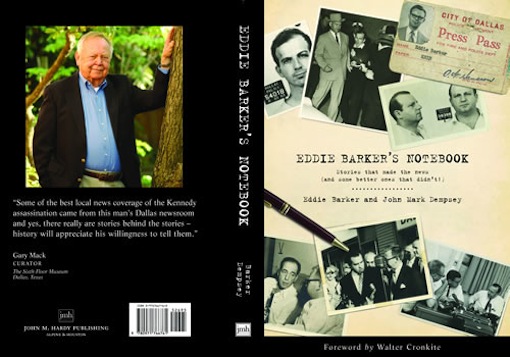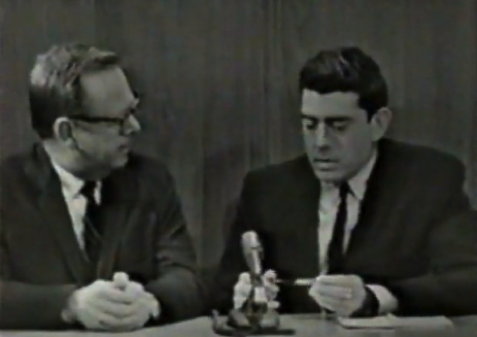R.I.P. Eddie Barker: Aug. 18, 1927 to July 23, 2012 (updated Monday, 3:45 p.m.)
07/23/12 10:09 AM

By ED BARK
@unclebarkycom
My name will always come up short of him -- in every way.
Dallas-Fort Worth television legend Eddie Barker, first to report the death of President John F. Kennedy and present at the creation of KRLD-TV (Channel 4), died Monday morning at the age of 84.
He never really got out of the broadcasting business, hosting a daily talk show on KPLT-AM (1490) in Paris, TX until late in his life. And as news director at Channel 4 (now KDFW/Fox4), he also hired Judy Jordan, who became the "First Lady" of D-FW television news after Barker made her an anchor.
Most accounts initially credited Dan Rather, as did the reporter himself, for being the first to report on television that Kennedy had died during that horrific Nov. 22, 1963 day in Dallas. But transcripts and tapes later showed that Barker's KRLD report from the Dallas Trade Mart came first at 1:11 p.m. that day. Walter Cronkite then haltingly broke the news to the nation five minutes later while both men stressed that it had yet to be officially confirmed. The authorized announcement to the nation came at 1:33 p.m. Barker had received the news from a trusted doctor at Parkland Hospital, where Kennedy had been taken.
"I don't think it's a question of being proud of being first, or regretting that I had such news," Barker told me in an interview tied to the 40th anniversary of the assassination. "I always thought of it as, 'Here's a story. I'm a reporter and we're trying to get news of what happened.' It was a helluva thing to have to tell people, and you had to have some dignity in how you said it. It's kind of a strange thing to be remembered for."
The late Cronkite, a longtime friend of Barker's, wrote the Foreword to his 2006 book, Eddie Barker's Notebook: Stories That Made the News (and some better ones that didn't!). Written in tandem with John Mark Dempsey, it came 36 years after Barker was let go as Channel 4 news director in 1972. He was just 45 years old, but new management decided that a change was needed.
Cronkite wrote that Barker "has fire in the belly -- a five-alarmer burning in his gut. When a good story breaks, Eddie becomes inspired. He leaves no stone unturned until he or members of his staff have mined the territory for every nugget of information. He remains doggedly at the story until his highly developed news sense tells him there is nothing left uncovered."
Jordan, among several old contemporaries interviewed by Dempsey for the book, said that "if Walter Cronkite was the most trusted man in America, Eddie Barker was the most trusted man in Dallas."
In comments Monday to unclebarky.com, Jordan said "there will always be a special place in my heart for my mentor and benefactor. Mr. Barker brought his instincts for truth-seeking to every undertaking, and taught me and many others invaluable professional and life lessons."
Jordan noted that a modeling job at Neiman-Marcus became available at around the same time the "girl Friday/gofer" job was offered by the KRLD TV and radio stations. But Barker gradually moved her from behind an off-camera desk to on-camera work as a reporter and then as D-FW's first woman news anchor.
"Working around men who wore makeup and could type faster than any girl was an irresistible novelty," Jordan said Monday. "I am so glad I chose as I did, and that Mr. Barker then chose me. I hope the Barker family can find comfort in the many wonderful stories and memories he left behind."
In his book, Barker wrote: "Looking back, I guess I was guilty of doing what I'm always cussing everyone else out for doing, putting an attractive face on TV. But Judy got better and better as a reporter and as an anchor. People really liked her. And you can't overestimate the importance of that in television."
Barker was born on August 18, 1927 as the only child of Edmund Asa Barker Sr. and the former Nannie Mae Meek. His birthplace is the Harlandale section of San Antonio, 102 Kirkwood Street, according to his book. He was delivered at home during the heart of the Great Depression.
Barker's first broadcasting job was as an announcer at San Antonio's KMAC radio. He was still in high school at the time, and had to quit his job at the drugstore. In November of 1949 he joined KRLD on the eve of its sign-on -- Dec. 3, 1949. He ended up anchoring the fledgling station's evening newscasts while also hosting a game show called Ring the Bell for Charity. "A truly terrible show," Barker wrote in his book.
He also met and interviewed a number of Hollywood stars and other notables passing through Dallas. Humphrey Bogart, Jayne Mansfield, Steve Allen, Audie Murphy and Rudy Vallee all made favorable impressions on him. Lucille Ball and Desi Arnaz did not.
"I have to say I didn't like them at all," he said of the couple's first visit to Channel 4 in the 1950s. "Very difficult to interview. They were terribly demanding about this or that camera angle. They really played the 'stars.' I thought she was pretty funny on TV up until then, but
that killed it for me."

His relationship with Rather blew hot and cold over the years after they teamed to cover the Kennedy assassination and its aftermath. KRLD was a CBS affiliate station, meaning that Rather and his crew used its studios to file their reports. They clashed in no uncertain terms after Rather told Barker he had heard that some elementary school students in University Park had cheered the president's death as they were let out of class.
Barker said in his book that he checked the story out and told Rather that the kids were merely cheering the fact that they had gotten out of school early. But in Barker's account, Rather went with the "city of hate" angle anyway, prompting the infuriated news director to boot Rather and 30-odd CBS cameramen, editors and producers out of KRLD studios.
Channel 4 then did its own story on the matter before "fences got mended" and Rather was invited back the next day.
Barker ended up inducting Rather into the Texas Radio Hall of Fame in 2003.
"I've always said there are two Dan Rathers," he wrote in his book. "One you are proud to call your friend, and the other who achieves his goals at any cost. And I have known them both . . . I've got to say I still really like him, warts and all."
Post-Channel 4, Barker remained closely involved with the Radio-Television News Director's Association, managing the exhibits for the organization's annual conventions. He also was RTNDA president in 1967.
In a 1995 interview, Barker commented on the technological advances of TV news in the years after the Kennedy assassination, during which there were no live cameras in place along the president's parade route.
"We were in no way positioned to cover an event as these people are today," he said. "I sit and look and just kind of marvel at the flexibility they have."
Still, he wondered whether the instant news to which viewers are now accustomed is always a better way to go.
"There are time when I've felt that maybe we had a little better control over what was said. Because in our day, I think the message was more important to some of us than the medium."
But mistakes were made back then, too, including early erroneous reports that vice president Lyndon Johnson had suffered a heart attack while riding in the fateful presidential motorcade. No era is perfect, as Barker would readily admit. But he was there at the creation -- and lived for a good long time to re-tell the tales.
Eddie Barker is survived by his wife, Jane Barker, and five children, including my former Dallas Morning News colleague, Leslie Barker Garcia. Funeral services are pending.
